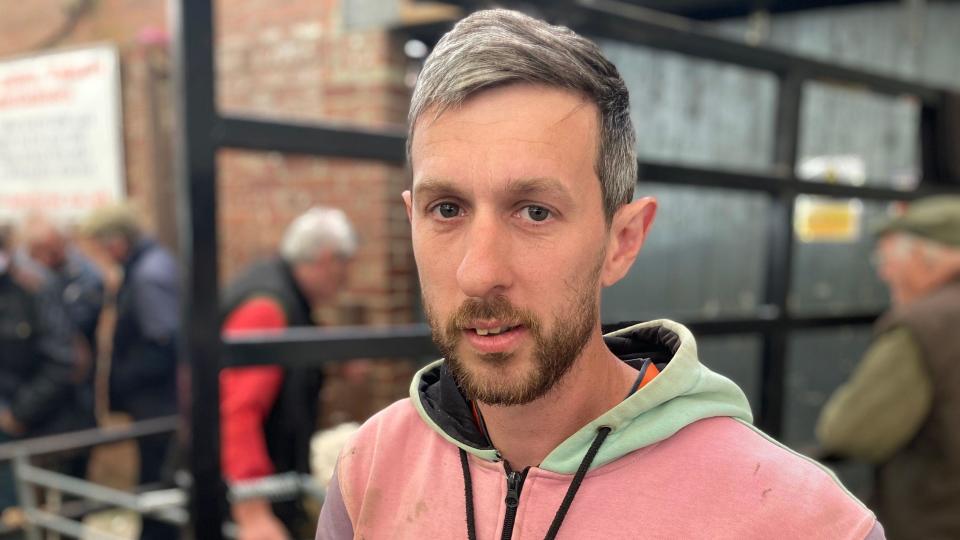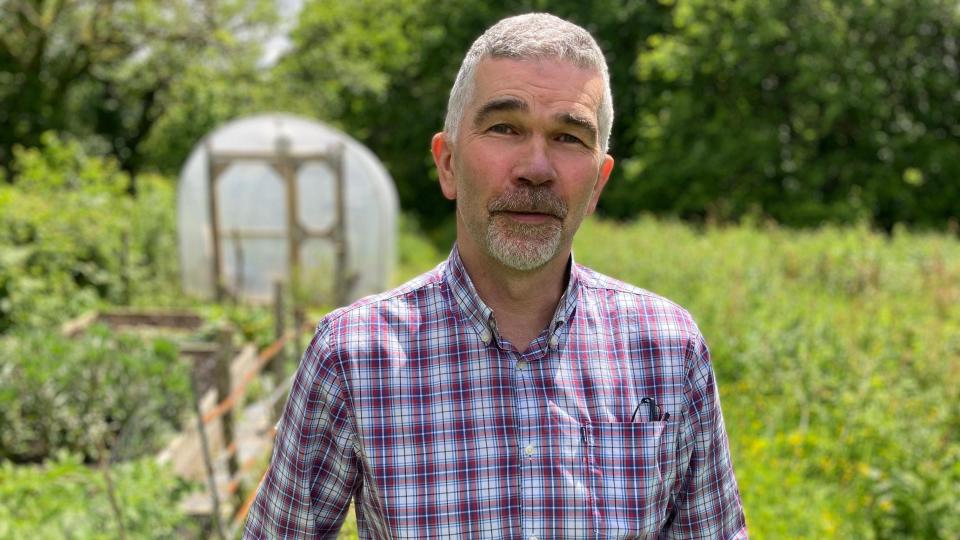Parties target protesting farmers in election pitch

Politicians from all sides are making a pitch for votes from the farming community in the wake of recent protests in Wales.
Farming policy is largely devolved to the Welsh government, but the budget for subsidies as well as decisions around trade lie with Westminster.
Farming and environmental groups are calling on the parties to commit to a major increase in funding for the sector ahead of the general election.
They want more than £500m a year allocated to Wales to help the move to greener support payments for farmers.
Amid the bleating of sheep and the clack of the auctioneer's gavel at Llanybydder mart in Carmarthenshire, there was talk of the upcoming election from farmers gathered around the ring.
Llyr Davies, 35, said it was a "tough" time to be a farmer, with rising costs and uncertainty over the changes to funding support.
"It's hard to see a future - I've got three young kids and trying to make sure you can provide for them is difficult," the sheep farmer said.
He said while politicians say they're listening, "it all sounds like empty promises until they follow up on that with action... and more money".

Lena Evans, 23, said the parties needed to appreciate that for "people my age trying to take on farms we're really struggling".
"People don't understand how much work farmers put in - and with the way everything has gone with prices rocketing as well, it's a real struggle."
Alun Thomas, 52, said he believed the recent protests in Wales had been an "eye-opener" for politicians who have had to "look at how the countryside works".
"It's a time of change and you don't know what's coming down the track," he said.

Farmer protests spread across Wales in the wake of the latest consultation on the Labour-run Welsh government's new sustainable farming scheme.
It is the replacement plan for EU-era subsidies for farms - offering payments linked to delivering environmental goals.
But farming unions had argued aspects of the scheme were unworkable and would cost jobs.
Just before the general election was called, the Welsh government announced it would delay the scheme's introduction by a year and set up a new roundtable group - including farming and environmental figures - to work through the issues.
Ministers said it showed they were listening to the industry's concerns, but their political opponents have sought to make hay out of the situation ahead of polling day.
The Welsh Conservatives launched their general election campaign on a farm, while Plaid Cymru held a press event at a livestock mart.

Elin Jenkins, policy officer for the Farmers' Union of Wales (FUW) said the parties were "definitely" courting the farming community ahead of the election.
The union was having to organise extra hustings events, with increased interest from candidates in speaking to farmers, she said.
Their key ask was a bigger budget from Westminster for agricultural support in Wales.
It follows a row between Cardiff Bay and Westminster in recent years over whether a pledge to match pre-Brexit funding levels had been honoured by the Conservative-led UK government.
There is currently £238m available to pay the main subsidy farms in Wales receive.
But the FUW wants "at least £450m per year" in protected funding for agriculture and rural development in Wales in future.
The other farming union, NFU Cymru, says over £500m a year is needed "just to stand still" and meet "shared ambitions for food, climate and nature".
"That budget not only supports farming and the production of food, but the future of rural communities - our local schools, local shops and the Welsh language," Ms Jenkins argued.
Aside from more funding - Welsh farming organisations also want closer scrutiny of future trade deals and a "level playing field" when it comes to import and export rules post Brexit, she said.
How important is farming in Caerfyrddin?
Farming employs around 38,000 people in Wales and 90% of the land area in the country is used for it
In the Caerfyrddin constituency, it has the fourth highest proportion of people working in agriculture of any parliamentary seat in Wales.
At least 8% of the workforce are in agriculture, along with energy and water, according to the last Census.
The numbers in farming help contribute to more than 16% of people being self-employed or with a small business here - well above the Welsh average.
The whole county of Carmarthenshire - which also includes the neighbouring Llanelli constituency - has 820,000 sheep and more than 190,000 cattle.

Environment groups have also called for a major uplift in public spending to support "nature-friendly farming" by the next UK government.
Wildlife and Countryside Link, a coalition of 82 conservation organisations, said funding needed to be doubled to "at least £6bn a year" across the UK.
Arfon Williams, head of land and marine policy for RSPB Cymru, said this worked out as "a minimum of £500m a year" for Wales.
"Moving away from the EU's Common Agricultural Policy to a new scheme in Wales we're asking our farmers to do an awful lot more," he said.
"It's only reasonable that there's an increased budget that goes along with that ask.
"This is the one opportunity we have in Wales to get a scheme that will help farmers help Wales meet a whole raft of environmental targets... and build the resilience of ecosystems that we all depend on."
What do the political parties say?
Plaid Cymru said its priority was "to protect the future of our family farms".
The party has pledged to give Wales a veto over future trade deals that "undermine Welsh agricultural communities" and says "in terms of funding, we must return to real terms pre-Brexit levels".
The Welsh Conservatives said it was "proud to stand with the thousands [of farmers] who have attended protests across Wales".
The party would "increase UK-wide farming investment by £1bn over the next five years... and ensure that the funding directed to the Welsh government for Welsh farmers increases with inflation," a spokesman said, adding that the party wanted to see the Welsh government's sustainable farming scheme reversed and redesigned.
Welsh Labour said a successful future for Welsh farming was about "producing food sustainably, looking after our environment and underpinning our rural communities, while also overcoming the climate and nature emergencies".
The party added the sustainable farming scheme was "key to achieving this" - "we will continue to work in partnership with the farming community, environmental groups and others to finalise a scheme that works long-term".
The Liberal Democrats has committed to an extra £1bn spend in the UK budget "to support profitable, sustainable, and nature-friendly farming", which the party said would equate to an extra £50m for Wales.
The party said it would renegotiate "disastrous" trade deals with Australia and New Zealand and "give our farmers the ability to trade with our European neighbours" with minimal need for checks.
The Green Party said it would triple the money spent on agriculture in Westminster, "with equivalent funding available to the Welsh government" "in order to support the transition to sustainable farming".
The party also says it will work with farmers and others to "transform our food and farming system" with "fair wages for growers" and aim to increase the amount of food grown and traded in the UK, "as locally as possible".
Reform UK says it recognises the "critical importance" of agriculture to the Welsh economy, as well as the "challenges" facing farmers.
It says it "aims to ensure a prosperous future for Welsh agriculture" by increasing the farming budget to £3 billion.
It also intends to scrap "climate-related farming subsidies that do not directly benefit food production" and replacing them with direct payments to farmers as well as reducing "the bureaucratic burden on farmers".


